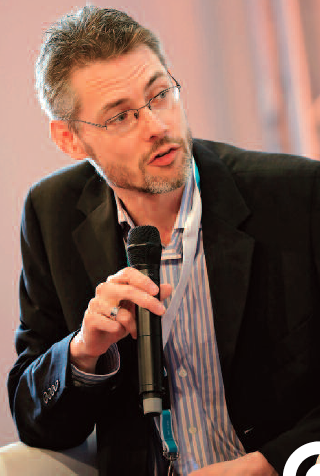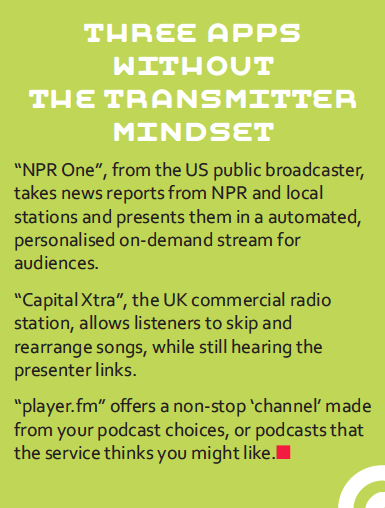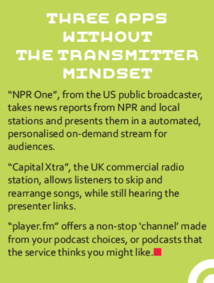
James Cridland is a radio futurologist - a writer, speaker and consultant helping media companies understand what’s next. He runs a weekly newsletter at james.cridland.net
Clearly, this is the work of a madman. Why would you take so much care over something, then make it unavailable almost as soon as you’ve made it?
That’s how radio works, every single day. We make stuff. We broadcast it, once, on our big shiny transmitter. And then we delete the audio file and make something else. This is what I call “the transmitter mindset”, and it makes no sense.
October 2014 saw the launch of the podcast Serial, which ran until Christmas. Series 1 was a runaway success: at the end of the series, it had achieved 40 million downloads. It did fantastically well. But then, something strange happened: people continued to download it. By the end of January, it had been downloaded 68 million times. It’s now achieved, according to some, over 100 million downloads.
In radio, we have an overwhelming need to “feed the transmitter” - preferably with live material. But Serial is just one example of why that transmitter mindset is old-fashioned and dangerous to radio’s future.
For one thing, the transmitter mindset is bad for breadth of content. We focus too much on what listeners might be in the mood for at 9.00am, rather than on great content. Nobody probably thinks listeners at that time want a dense piece of academic, philosphical musings, covering items like the Maya civilisation, presented by a man officially called Baron Bragg of Wigton. Yet this programme exists. It’s called In Our Time - and has achieved 27 million downloads so far, as well as being broadcast at 9.00am on Thursdays on BBC Radio 4. It’s definitely a programme you have to be in the mood for: which is why it works so well on-demand.
That’s how radio works, every single day. We make stuff. We broadcast it, once, on our big shiny transmitter. And then we delete the audio file and make something else. This is what I call “the transmitter mindset”, and it makes no sense.
October 2014 saw the launch of the podcast Serial, which ran until Christmas. Series 1 was a runaway success: at the end of the series, it had achieved 40 million downloads. It did fantastically well. But then, something strange happened: people continued to download it. By the end of January, it had been downloaded 68 million times. It’s now achieved, according to some, over 100 million downloads.
In radio, we have an overwhelming need to “feed the transmitter” - preferably with live material. But Serial is just one example of why that transmitter mindset is old-fashioned and dangerous to radio’s future.
For one thing, the transmitter mindset is bad for breadth of content. We focus too much on what listeners might be in the mood for at 9.00am, rather than on great content. Nobody probably thinks listeners at that time want a dense piece of academic, philosphical musings, covering items like the Maya civilisation, presented by a man officially called Baron Bragg of Wigton. Yet this programme exists. It’s called In Our Time - and has achieved 27 million downloads so far, as well as being broadcast at 9.00am on Thursdays on BBC Radio 4. It’s definitely a programme you have to be in the mood for: which is why it works so well on-demand.
Vous aimerez aussi
The transmitter mindset is bad for quality. We believe, wrongly, that live radio is the most important thing. So some of us fluff our way through bits of live radio and do things that could have been done better with a bit of preproduction. Every time you hear a guest’s phone line go down, a messy unclear junction, or a guest cut off to hit an arbitrary travel bulletin, you’ve heard radio that could be improved if it wasn’t for the belief that feeding the transmitter is the most important thing.
The transmitter mindset short-changes listeners: because we believe the transmitter needs to be fed with all-new material. Yet with modern radio research, we can know that only 12% of listeners at 4.15pm, for example, would have heard the interview we broadcast at 6.35am. For most of the audience, this is brand new content that they probably want to hear. Over weekends, this is an even better opportunity. New content for most of the audience, and cheap, too.
And the transmitter mindset is bad for archiving. Because we make most of our radio live, we have to work hard to archive it: leading to rushed award entries, poorly repurposed podcasts, and added complication for online re-use. While transmitters are still wonderful and important, the primacy of “live” has to take second-place to the primacy of great content. I believe the transmitter mindset has no place in the future of radio.
And the transmitter mindset is bad for archiving. Because we make most of our radio live, we have to work hard to archive it: leading to rushed award entries, poorly repurposed podcasts, and added complication for online re-use. While transmitters are still wonderful and important, the primacy of “live” has to take second-place to the primacy of great content. I believe the transmitter mindset has no place in the future of radio.















